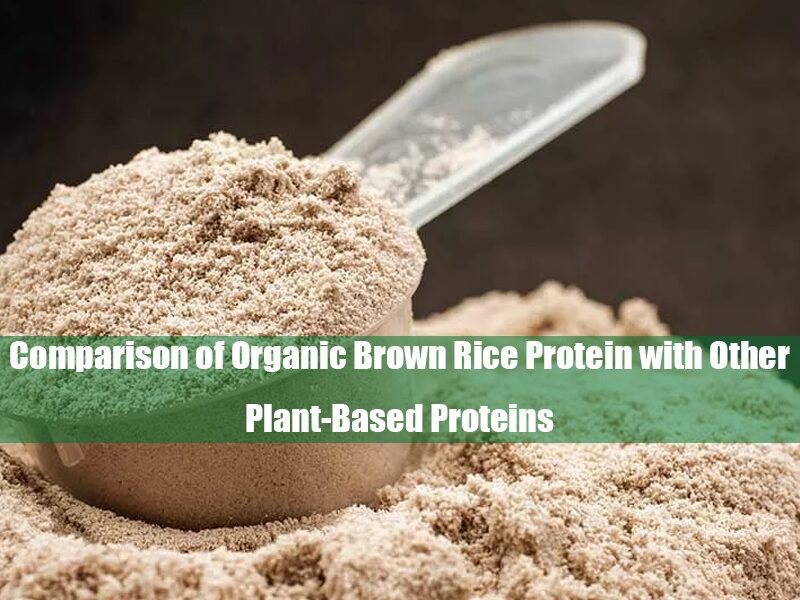Table of Contents
Organic maltodextrin, a polysaccharide derived from natural, non-GMO sources such as corn, rice, and potatoes, is commonly used as a food additive. It serves as a bulking agent, stabilizer, and sweetener in a variety of products. With the growing consumer preference for organic and natural ingredients, the demand for organic maltodextrin has surged. This detailed analysis will delve into the health benefits and potential risks associated with organic maltodextrin, covering its nutritional profile, impact on blood sugar levels, gut health, and any possible adverse effects.

Nutritional Profile of Organic Maltodextrin
Organic maltodextrin is a carbohydrate typically produced through the partial hydrolysis of starch. It consists of glucose units linked together in short chains. The nutritional profile of organic maltodextrin is similar to that of conventional maltodextrin, but it is derived from organically grown crops, free from synthetic pesticides and genetically modified organisms (GMOs). Key nutritional aspects include:
- Caloric Content: Organic maltodextrin provides approximately 4 calories per gram, similar to other carbohydrates. It is often used in food products to increase energy content without altering taste or texture significantly.
- Glycemic Index: Organic maltodextrin has a high glycemic index (GI) ranging from 85 to 105, which means it can rapidly raise blood sugar levels. This property makes it useful in sports drinks and energy supplements, where quick energy replenishment is needed.
- Carbohydrate Content: As a carbohydrate, organic maltodextrin is primarily composed of glucose units, making it a quick source of energy. It is low in fiber, protein, and fat, which means it should be consumed in moderation as part of a balanced diet.
- Purity and Quality: Being organic, this maltodextrin is free from synthetic additives, preservatives, and chemical residues, making it a cleaner option compared to conventional maltodextrin.

Health Benefits of Organic Maltodextrin
Organic maltodextrin offers several health benefits, particularly for specific populations such as athletes, individuals with certain medical conditions, and those seeking organic food options. Key health benefits include:
- Energy Boost for Athletes: Due to its high glycemic index, organic maltodextrin is rapidly digested and absorbed, providing a quick source of energy. This makes it an ideal ingredient in sports drinks and energy supplements for athletes who need immediate energy replenishment during intense physical activity.
- Post-Workout Recovery: Organic maltodextrin can aid in post-workout recovery by rapidly replenishing glycogen stores in muscles. This helps reduce muscle fatigue and improve recovery time, making it a valuable component of recovery drinks and snacks.
- Nutritional Support: For individuals with specific medical conditions such as malnutrition, gastrointestinal disorders, or those recovering from surgery, organic maltodextrin can serve as an easily digestible source of calories. It is often included in medical nutrition products to provide energy without taxing the digestive system.
- Bulking Agent in Food Products: Organic maltodextrin is commonly used as a bulking agent in food products, providing volume and texture without significantly altering taste. It is particularly useful in low-calorie and low-fat foods, helping to improve mouthfeel and satiety.
- Safe for Organic Diets: For consumers following an organic diet, organic maltodextrin provides a safe and compliant option. It ensures that the food products they consume are free from synthetic pesticides, GMOs, and chemical residues.
Impact on Blood Sugar Levels
One of the primary concerns associated with maltodextrin, including organic varieties, is its impact on blood sugar levels. Due to its high glycemic index, organic maltodextrin can cause a rapid spike in blood glucose levels. This effect can be both beneficial and potentially harmful, depending on the context of its use:
- Rapid Energy Source: For athletes and individuals engaging in strenuous physical activity, the rapid increase in blood sugar levels can provide a quick energy boost, enhancing performance and endurance.
- Post-Exercise Glycogen Replenishment: After intense exercise, the body’s glycogen stores are depleted. Consuming organic maltodextrin can help quickly replenish these stores, aiding in recovery and reducing muscle fatigue.
- Potential Risks for Diabetics: For individuals with diabetes or insulin resistance, the rapid rise in blood sugar levels can be problematic. Consuming organic maltodextrin can lead to hyperglycemia, making it important for these individuals to monitor their intake and choose lower-GI carbohydrate sources.
- Moderation is Key: For the general population, consuming organic maltodextrin in moderation as part of a balanced diet is essential. It should not be relied upon as the primary source of carbohydrates, and combining it with other low-GI foods can help mitigate its impact on blood sugar levels.
Impact on Gut Health
The effect of organic maltodextrin on gut health is an area of growing interest. While it is generally considered safe for consumption, its impact on gut microbiota and digestive health warrants attention:
- Digestibility: Organic maltodextrin is easily digestible, making it suitable for individuals with compromised digestive systems. It is often included in medical nutrition products for patients recovering from surgery or those with gastrointestinal disorders.
- Gut Microbiota: Emerging research suggests that maltodextrin can influence the composition of gut microbiota. Some studies indicate that maltodextrin may reduce the abundance of beneficial gut bacteria, potentially leading to imbalances in the gut microbiome. However, more research is needed to fully understand these effects.
- Digestive Tolerance: While organic maltodextrin is generally well-tolerated, excessive consumption can lead to digestive issues such as bloating, gas, and diarrhea. It is important to consume it in moderation and consider individual tolerance levels.
- Prebiotic Potential: Some forms of maltodextrin, such as resistant maltodextrin, have prebiotic properties, meaning they can promote the growth of beneficial gut bacteria. However, standard organic maltodextrin lacks these properties and does not provide the same benefits to gut health.
Potential Risks and Adverse Effects
While organic maltodextrin offers several health benefits, it is important to be aware of potential risks and adverse effects associated with its consumption:
- Blood Sugar Spikes: As mentioned earlier, the high glycemic index of organic maltodextrin can cause rapid spikes in blood sugar levels. This is particularly concerning for individuals with diabetes or insulin resistance, who need to manage their blood sugar levels carefully.
- Weight Gain: Consuming large quantities of organic maltodextrin can contribute to weight gain, especially if it is not balanced with physical activity. As a high-calorie carbohydrate, it can add to overall calorie intake, leading to potential weight gain if not accounted for in the diet.
- Digestive Issues: Excessive consumption of organic maltodextrin can cause digestive discomfort, including bloating, gas, and diarrhea. It is important to consume it in moderation and be mindful of individual tolerance levels.
- Potential Allergies: While rare, some individuals may have allergies to the source materials used to produce organic maltodextrin, such as corn, rice, or potatoes. Allergic reactions can include symptoms such as itching, swelling, and difficulty breathing.
- Nutrient Dilution: Organic maltodextrin is low in fiber, protein, and other essential nutrients. Relying too heavily on it as a carbohydrate source can lead to nutrient dilution, where the diet lacks important vitamins, minerals, and other nutrients necessary for overall health.
Practical Applications and Recommendations
Given the health benefits and potential risks associated with organic maltodextrin, it is important to consider practical applications and recommendations for its consumption:
- Sports Nutrition: Organic maltodextrin can be a valuable component of sports nutrition products, providing quick energy and aiding in post-exercise recovery. Athletes and active individuals can benefit from its use in energy bars, gels, and recovery drinks.
- Medical Nutrition: For individuals with specific medical conditions or those recovering from surgery, organic maltodextrin can serve as an easily digestible source of calories. It is often included in medical nutrition products to provide energy without taxing the digestive system.
- Moderation and Balance: For the general population, consuming organic maltodextrin in moderation as part of a balanced diet is key. It should not be relied upon as the primary source of carbohydrates, and combining it with other nutrient-dense foods can help ensure a well-rounded diet.
- Monitoring Blood Sugar Levels: Individuals with diabetes or insulin resistance should monitor their blood sugar levels carefully when consuming organic maltodextrin. It is advisable to choose lower-GI carbohydrate sources and consult with a healthcare professional for personalized dietary recommendations.
- Considering Individual Tolerance: Digestive tolerance to organic maltodextrin can vary among individuals. It is important to be mindful of individual tolerance levels and adjust intake accordingly to avoid digestive discomfort.

Conclusion
Organic maltodextrin, derived from natural, non-GMO sources, offers several health benefits, particularly for athletes, individuals with specific medical conditions, and those seeking organic food options. Its high glycemic index provides a quick source of energy, making it valuable in sports nutrition and post-exercise recovery. However, it is important to be aware of its potential risks, including blood sugar spikes, weight gain, digestive issues, and nutrient dilution.

